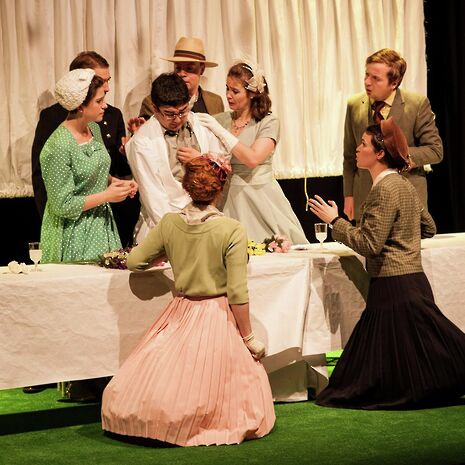Albert Herring
Edie Franklin adores this fun and intricate opera

The opera opens with an unexpected medium. A 1950s spot cream advert is playing, informing us of the quite astounding power of this particular brand. A generic 1950s woman goes about her skin cream application with a suspicious enthusiasm. The video stutters and repeats a line maddeningly. The beginning of the opera is a kind of relief from this tense video, and yet the tension is subtly continued and neatly handled, humming away in the contorted smiles of the busy body May Committee, and the complex score. Though an ardently comic opera, Britten has written something with a palpable anxiety. The minutia concerns of this village constantly traverse the border between hilarity and hysteria. The production is very funny, but it does not ignore the subtleties of Britten’s material. This subtlety is somehow immediate – Albert Herring’s plight is felt, we laugh at him and with him.
Synthetic grass carpet and suspended, quaint window panes, the stage of Albert Herring achieves the unnerving cleanliness of 1950s suburbia; a cool departure from the traditional 1900 backdrop. Set in a parochial Suffolk village, the drama of Albert Herring revolves around the failure of the May Committee to find a sufficiently virtuous woman to be May Queen. Thus Albert Herring (Hiroshi Amako), local mummy’s boy and certified virgin, is chosen to be the new May King. However, irked by the brazen canoodling of Sid (Peter Lidbetter) and Nancy (Olivia Bell), Albert decides to sample the debauchery offered in his local town. Scandal ensues.
Britten’s observation of English caricatures is expert, and the cast utilise these characters extremely well, managing farce and cliché without wandering into predictability. The choreography, with the doll-like uniform gestures, heightened the bizarre atmosphere. At times the May Committee's plotting approaches menacing proportions, and we could almost forget that they are merely purity obsessed divs from the past. But Hiroshi Amako’s Albert diffuses any real menace. Sitting in the middle of a table surrounded by the ludicrous May Committee, he grimaces slightly and glances at the audience with a dry knowingness, intriguingly counterpoised to his much lauded ‘purity’.
The orchestra, conducted by Benedict Kearns, played with a panache which paralleled the actors. Never mundane, yet not so abstract as much of Britten’s other work, the score trills beside the cast’s capable and characterful voices, but also occasionally juxtaposes with the plot, creating a very textured and excitable sound. Various effective clarinet and flute solos feature in the opera, and the music is particularly foregrounded following the interval, when we hear Britten’s score play plot and character alone. When the caricatures of the May Committee exasperate, the music maintains a constant intrigue. This production is marvellously unnecessary to analyse, all the humour and moments of melancholy are on the surface – obligingly placed there for us by an ensemble of easy wit.
 News / Colleges charge different rents for the same Castle Street accommodation2 March 2026
News / Colleges charge different rents for the same Castle Street accommodation2 March 2026 News / King’s hosts open iftar for Ramadan3 March 2026
News / King’s hosts open iftar for Ramadan3 March 2026 Theatre / Lunatics and leisure centres 4 March 2026
Theatre / Lunatics and leisure centres 4 March 2026 News / Angela Merkel among Cambridge honorary degree nominees27 February 2026
News / Angela Merkel among Cambridge honorary degree nominees27 February 2026 News / News in Brief: waterworks, wine woes, and workplace wins 1 March 2026
News / News in Brief: waterworks, wine woes, and workplace wins 1 March 2026







